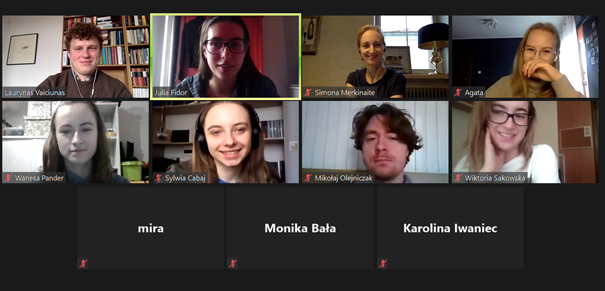The project aims to reflect on the state of democracy (move towards anti-democratic reforms) in the context of 1989 and the transition to democracy and will cover four countries: Hungary, Latvia, Lithuania, and Poland. The project is implemented by Open Lithuania Foundation in partnership with the Res Publica Foundation and Kolegium Europy Wschodniej im. Jana Nowaka- Jeziorańskiego (Jan Nowak-Jezioranski College of Eastern Europe) and with financial support through Europe for Citizens Program.
Read the short report written by Julia Fidor.
What does 1989 mean to us? Has it any connection with us personally, with our family, with our memories?
We came to the conclusion that young people don’t think too much about this period of time. We all agreed that this meeting may change our perspective.
Everyone gave a short speech about their personal experience.
Then we started considering what really happened in 1989? How would we describe the change of 1989, what happened this year?
We briefly discussed what happened from an economic perspective but we also talked about society’s problems and changes in people’s thoughts.
What is more, in this meeting we also aimed to discuss what the disadvantages of communism were. Sylwia Cabaj mentioned troubles with traveling, food rations, lack of freedom of speech. Mira Fedorak claimed that people were just tired of what they had been experiencing for many years. People wanted freedom, democratic government, they wanted to decide for themselves.
How do we feel about the statement that 1989 was the beginning of the free society, is this the case? Is this the way we should look at 1989?
Moving to the present, we considered what it is like in our country now: what is the state of democracy? What causes would move us to action? The democracy and freedom which our parents were so excited about are now almost gone. It is great that Polish people have their own ideas and opinion. They really do care about their current situation. – says Mira – I was also protesting. But one day I realized that I am afraid of going out… afraid of being hurt… this is the bad side of protests.
Was it the protest about the state of democracy or about one particular issue? Agata Kucharzewska claims that the reason why all women stayed protesting on the streets was not only the abortion law but also all changes proposed by our government.
Civil society – what do we understand by this term? People help each other. They don’t wait for the government to solve their problems. They take active participation in changing what they don’t like. – Mikołaj Olejniczak says. He also adds some information about Warsaw’s project, The city is ours. According to what Agata says, Polish protest was a great example of civil society.
How was 1989 covered in the curriculum? It wasn’t covered in a way it should have been. The program of teaching history in Polish schools is strange. – claims Sylwia. – Modern history is usually at the very end and often there is no time to cover it.
Learning about communism should teach us how important democracy is.


